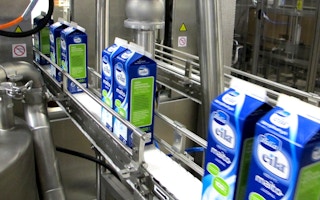Food packaging giant Tetra Pak announced on Wednesday that its carton package manufactured entirely from plant-based raw materials has arrived on the shelves of retail shops in Finland.
The Sweden-based firm said Finnish dairy producer Valio became the first company in the world to sell products packaged in Tetra Rex, which is made of certified paperboard cartons, bioplastic laminate films and necks and caps derived from sugarcane.
Valio is trying out the package with its Eila lactose-free semi-skimmed milk drink in retail outlets across Finland until the middle of March, and then based on feedback from consumers, the dairy firm will decide whether to adopt the cartons more broadly across its chilled product range.
Tetra Pak said the launch of the carton with all its components, including the plastic caps, made from biomass as a renewable source of raw materials instead of fossil-fuel based derivatives, signals an important milestone in the company’s commitment to environmental sustainability across its portfolio and supply chain.
“
We have been gradually increasing the use of renewable materials in our packages over the years, and that work will continue, as we look for ways to extend the fully-renewable concept to other parts of our portfolio.
Charles Brand, executive vice president for product management and commercial operations, Tetra Pak
Christina Chester, product director of Tetra Pak’s carton gable top, told Eco-Business that bio-based plastics or bioplastics - though derived from renewable plant materials - have exactly the same properties and appearance as its petrochemical-based polyethylene counterparts.
Therefore, they do not easily biodegrade or decompose like plants do.
“This means that it can be recycled in exactly the same way as conventional plastics,” she added.
Chester explained that Tetra Pak does not use biodegradable plastic in its packages because the materials need to withstand light, oxygen and water for long periods of time to preserve the product and prevent spoilage.
Tetra Rex’s fully renewable package can be identified by the words “Bio-based” printed on the gable of the package and the materials can be traced from sustainable sources, said the packaging firm.
The firm’s renewable packaging initiative started in 2007 when it launched the world’s first carton certified by the Forest Stewardship Council and began using its bio-based caps in 2012; the Tetra Rex packages were launched in October last year.
“We have been gradually increasing the use of renewable materials in our packages over the years, and that work will continue, as we look for ways to extend the fully-renewable concept to other parts of our portfolio without compromising safety, quality or functionality,” said Charles Brand, Tetra Pak’s executive vice president for product management and commercial operations.

















